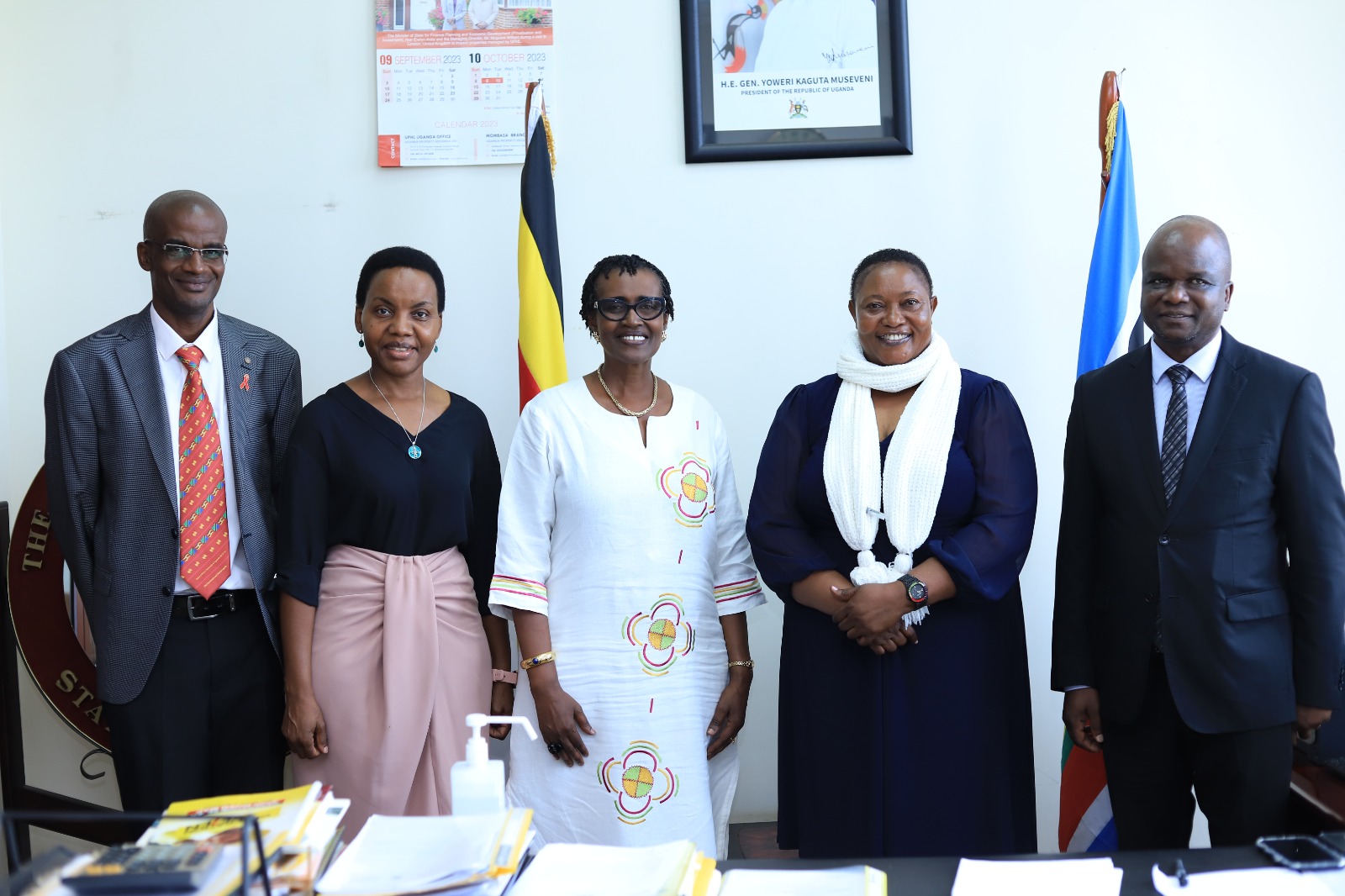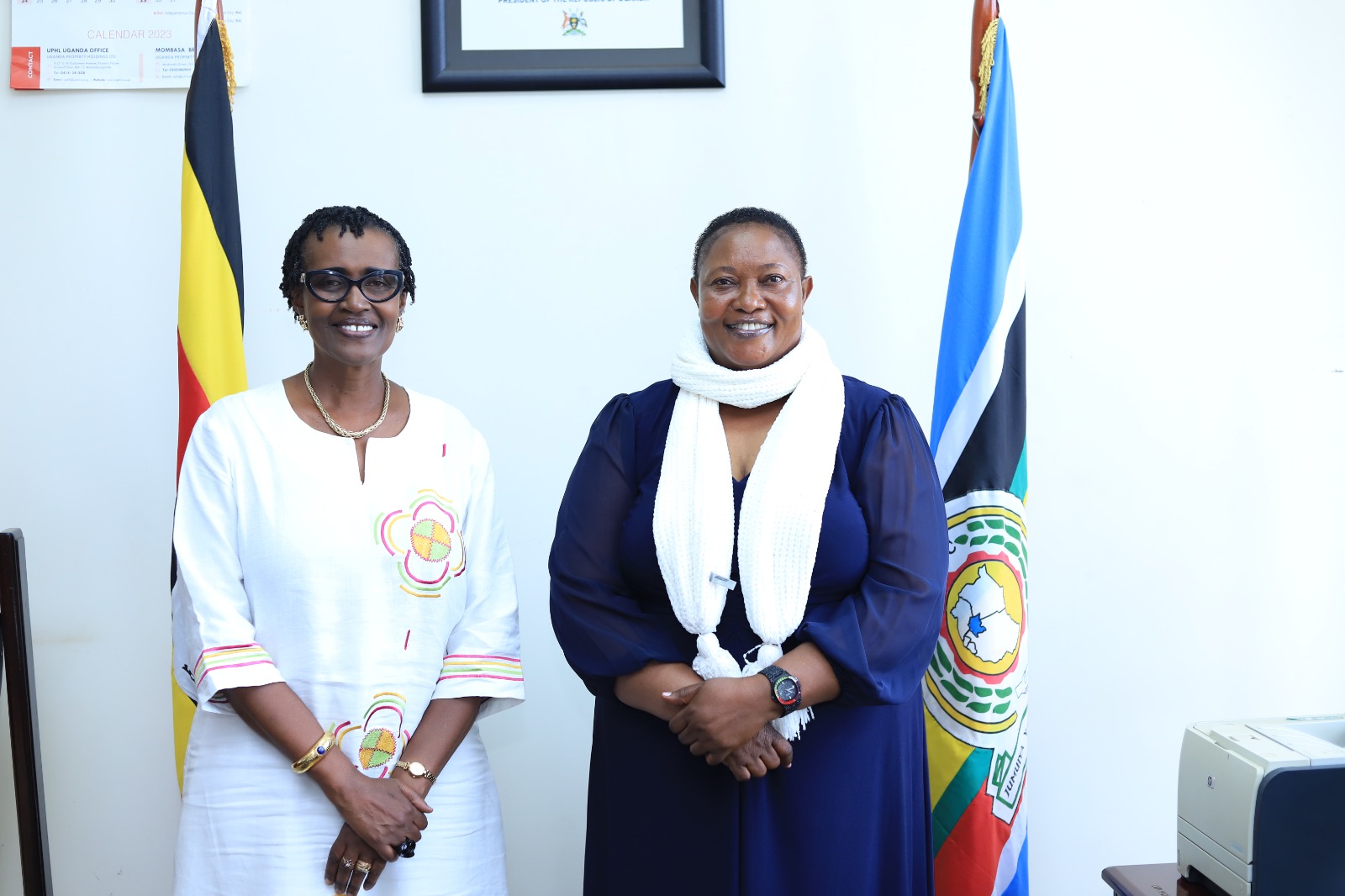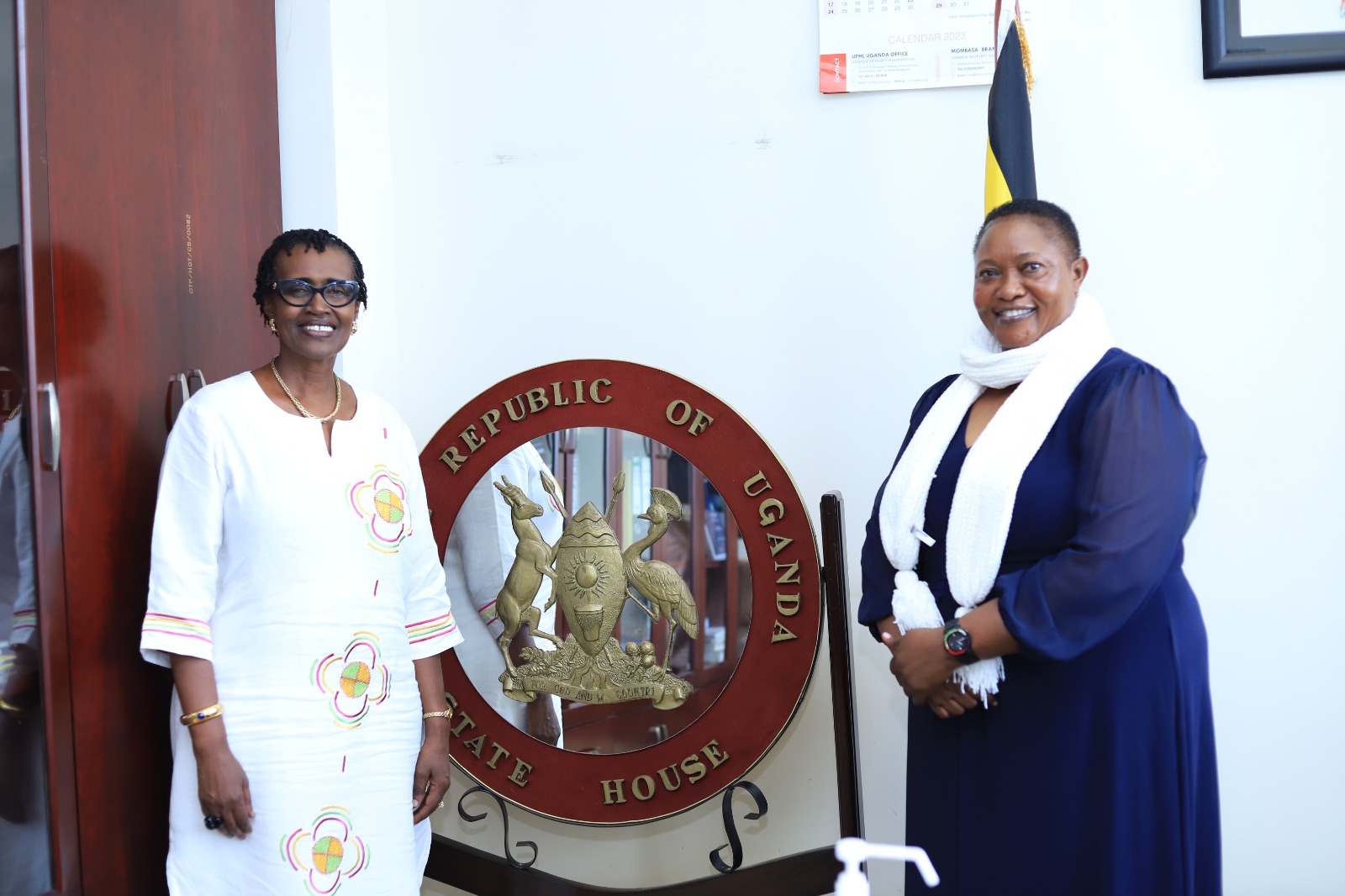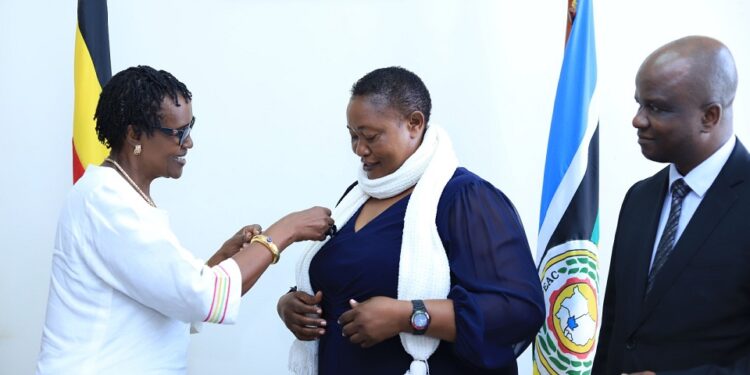The Minister for the Presidency, Hon. Babirye Milly Babalanda has received an award from the Joint United Nations Programme on HIV/AIDS (UNAIDS) for her contribution towards the fight against HIV/AIDS in Uganda.
The medal was presented to the Minister by the UNAIDS Executive Director, Ms. Winnie Byanyima during a meeting held at the Office of the President in Kampala yesterday.
“I have been honoured and pleasantly surprised to receive a medal from @UNAIDS delivered by the Exec. Dir, Hon. @Winnie_Byanyima, in appreciation of my humble contribution to the fight against HIV/AIDS. Thank you, my Sister, for your contribution as well,” Hon.Babalanda tweeted shortly after receiving the medal.
During the engagement, Hon. Babalanda appreciated UNAIDS for the continuous and unwavering support in the fight against HIV/AIDS over the last 40 years.
“I would like nonetheless to single out the support from the UNAIDS Country office which has continuously provided technical assistance to the planning, implementation, coordination and oversight of the national HIV response. HIV/AIDS remains one of the areas with the most visible success that our government is proud of and the contribution of our partners to the HIV and AIDS efforts over the last 40 years has without doubt contributed to this success,” Hon. Babalanda noted.

She informed her guest that Uganda has made tremendous progress in the fight against HIV and AIDS reducing infections from as high as 18% in the late 1990s to the current 5.2%.
“AIDS related-deaths have reduced from about 120,000 in 2010 to 17,000 in 2022. Although we are not yet there, I strongly believe that working together, Uganda will be able to achieve epidemic control and reach the goal of ending AIDS as a Public Health threat by 2030,” she added.
On behalf of the government of Uganda, the Minister commended Ms. Byanyima for her successful stewardship towards the Global UNAIDS program, saying that her voice and leadership has remained profound and unfettered especially during and after the COVID-19 outbreak.
“Uganda has started discussions on sustainability and transition of the donor supported programs and I request for your support as always. The government as part of the Presidential Fast Track Initiative to End AIDS by 2030 has rolled out the HIV mainstreaming agenda which requires all institutions to plan for HIV and AIDS as part of their overall mandate,” Hon. Babalanda asserted.
“We have started with Ministries, Departments and Agencies and shall later roll out to the non government departments. This initiative combined with others look promising for Uganda to free itself from donor dependency by reorganizing and harnessing additional resources domestically. its resources I thank you for the technical and financial support received at the initial stages of this program and request you for more support to this program.”
The Minister further disclosed that the Government of Uganda cherishes, and is committed to the continued strengthening of Uganda’s partnership with the UNAIDS Program, and remains ready to continue collaboration on all matters of mutual interest.
She also requested her guest to use her office to support the government in its programs that contribute to the sustainability roadmap, data management from enhancing household incomes and improving quality of life of Ugandans.
“The government is currently implementing the Parish Development Model which is aimed at improving household incomes, creating jobs and promoting value addition,” she said.
“Being the Minister in charge of the presidency; I get weekly updates on the poverty situation in the country. The Resident District and City Commissioners whom I supervise; continue to spearhead poverty alleviation programs. We need an information program that can capture these structural interventions to give an accurate picture and enable us to calibrate our interventions even better. I request that you support the Uganda AIDS Commission as they coordinate the sustainability discussion as well as support them to put in place a system to capture data in multi-sectoral interventions. ”

On the issue of Uganda’s LGBT Law, the Minister requested that the UNAIDS studies this law in detail to derive their own assessment of the intentions of the law.
“I wish nonetheless to state here that there is so much that has been spoken about this law but which in reality is not what it stands for. H.E the President promised to break down this law for the entire world to appreciate what it genuinely contains. The law does not witch-hunt any law-abiding citizen and neither does it interfere in the human rights of the citizens,” she said.
“I have brought up this point here because I supervise the Uganda AIDS Commission that has been in the news as one of those that will lose funding support on account of this law. Uganda AIDS Commission requires significant funding because of the annual burden of HIV/AIDS cases that Uganda still has.”
On her part, Ms. Byanyima commended His Excellency the President and Hon. Babalanda for their commitment, openness, and the unwavering leadership in the fight against HIV and AIDS in Uganda.
She also appreciated the Minister for convening the Resident District/City Commissioner workshop in greater Masaka and Elgon regions where she provided a platform to Uganda AIDS Commission, UNAIDS, Ministry of Health, National Medical Stores to engage RDCs and offer clarity on the need for continued health services in the face of the Anti-Homosexuality Act.
Ms. Byanyima however called upon the Minister to use her office to address the unintended consequences of the Anti-Homosexuality Act in part through -convening RDCs in other regions and provide a platform to the Ministry of Health, Uganda AIDS Commission, UNAIDS, Director of Public Prosecution, National Medical Stores to orient and sensitize district security teams on the need for continued provision of health services with no discrimination as per doctors’ oath.
“We should support the use of National Identity cards for Unique identification of who is getting the ARVs, to address any linkages, improve ordering and fully access to health services. Hon Minister, the last mile is a very difficult one, especially where we can’t uniquely identify those that access services, determine the gap and purpose to reach those not in care,”Ms. Byanyima said.
“Hon Minister, it’s possible now that a patient can get ARVs from multiple health centres due to lack of unique identifier and this can result in abuse, no-adherence and increased cost of HIV response. I urge you to engage the President and relevant Ministries and government departments for a safe use of National Identity Cards to uniquely determine those in care, those not in care and confidentiality talk about the actual number served. This will further address the current media outcry on use of ARVs for pigs and chicken and enhance development partners trust and confidence. You should be the champion of this issue to the President and the rest of the Country.”

On the other hand, Ms. Byanyima appreciated the government of Uganda for offering free Universal Primary and Secondary Education and granting pregnant girls a chance to return to school.
“We should now advocate for increased budget allocation to make this a reality and enable adolescent and young girls to be retained in school and complete the education cycle.”
The meeting was also attended by Uganda AIDS Commission Director General, Dr. Nelson Musoba, Senior Presidential Advisor on Research Dr. Daniel Ssekiboobo, among others.
Do you have a story in your community or an opinion to share with us: Email us at editorial@watchdoguganda.com













